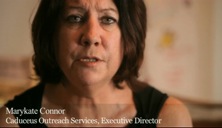Caduceus Outreach Services from Monica Jensen.
The Health Department wants to cut $375,000 from Caduceus. Marykate Connor, Caduceus’ executive director, said her clients may fall through the cracks of the social-services system if the program closes. She said that means the city will lose a unique psychiatric treatment service: “In San Francisco, you can get a pro-bono attorney, a bottle of vodka, or a rock of crack-cocaine easier than you can a pro-bono mental health psychiatrist.”
The Health Department has already proposed two rounds of budget cuts and is preparing for a third. The first two rounds plugged $100 million of the $163 million deficit. But now, faced with plummeting tax revenues due to the economic downturn, Mayor Gavin Newsom has told all departments to slash their budgets by 25 percent.
The health department is looking for cuts in funding from as many as 33 outpatient treatment programs dealing with mental illness, drug addiction and other problems. At the same time the budget cuts come when many organizations are being squeezed by falling philanthropic donations. Thus, San Francisco nonprofits like Caduceus are forced to consider changes to services, potential mergers or even closure.
|
|
|
Marykate Connor, executive director of Caduceus, said the organization refuses Medi-Cal payments to protect patient confidentiality. Photo by Monica Jensen/The Public Press. |
“Most nonprofits in San Francisco are small, and small nonprofits always struggle, but right now, it is even worse than normal,” said Carol Silverman, research director for the Institute for Nonprofit Organization Management at the University of San Francisco.
Caduceus’ dilemma: confidentiality or cash
Inside the second-floor office of Caduceus on Clementina Street, there is a living room flanked by soft couches where people lounge and take naps. A stuffed orangutan sits on white water pipes that run across the ceiling.
Caduceus’ clients desperately need mental-health treatment. Most live on the streets, some were recently released from prison or are fighting various addictions.
Clients attend regular counseling meetings, and Caduceus employees establish relationships with them. The organization helps clients find housing, legal counsel, food and other services.
Caduceus is unique, Connor said, in that it provides mental health treatment in an environment where clients with drug addictions, post-traumatic stress disorder or schizophrenia can feel vulnerable, yet remain safe.
Caduceus received about $80,000 from the city in fiscal year 2006-2007. The funding jumped to roughly $365,000, then $375,000, in the last two fiscal years. Caduceus also received about $125,000 in federal funds this year. But that funding is contingent on Caduceus matching 25 percent of the federal funding with private donations. This fiscal year Caduceus also received $45,000 in private donations, Connor said.
Barbara Garcia, deputy director of health at the Department of Public Health, said that Caduceus did not lose funding for being an ineffective nonprofit, but because it declined to accept funds from Medi-Cal.
“I have been a very big supporter of Caduceus,” Garcia said. “I have watched their development over the years, but we are faced with a real complex dilemma that we have to cut. This program was vulnerable because they did not receive Medi-Cal funding.”
To receive Medi-Cal, California’s Medicaid program providing health care to low-income children, their parents, elderly and the disabled, Caduceus would have to report too much personal information about its clients, said Connor. Caduceus only asks for the names of its clients. For that reason, she said, the organization treats clients who are afraid and will not be treated by other mental health care facilities.
“We don’t want it,” Connor said, calling Medi-Cal “incredibly restrictive.” She said it pays only for some expenses. “Medi-Cal billing is horrific, and we don’t want to waste our time doing it. We would need a computerized tracking system, or at least the funding for it, and we don’t have it.”
While other organizations like Westside Community Services do similar types of work, no San Francisco organization is like Caduceus. The department also funds 10 for-profit mental health clinics in San Francisco, Garcia said.
The big picture
San Francisco is trying to balance its budget by June 30 — with a projected citywide $438.1 million deficit as of March 31. Meanwhile the recession hinders private donations to the nonprofit sector just when they are most needed.
Carol Silverman, of the Institute of Nonprofit Organization Management, co-authored an April report on San Francisco’s nonprofit sector and found that, even in 2008 when the economic downturn was less severe, the city’s nonprofit groups faced critical fundraising challenges, declining revenues and decreasing confidence. Almost half of the nonprofits queried found it difficult to raise funds in 2008. Almost one-fifth were uncertain if they would meet revenue needs at all.
This makes life hard for populations traditionally served by nonprofit groups, especially people living on the streets. Connor said the homeless “are desperate for the services, but are criminalized for not being in the services even though they do not exist.”
The San Francisco Foundation’s Denise Martin said that for a nonprofit organization to survive the recession and budget cuts, it will need strong leadership, and should have diverse sources of funding. Such organizations may have to merge with similar organizations. “Organizations that are traditionally dependent on public funding — that is a tough position to be in,” she said.
Connor said Caduceus was privately funded through donations and grants for 10 years. At first she did not want to take city funding, but later determined that Caduceus could not survive on private funding alone. “It is always difficult to find small family foundations that are interested in funding programs that serve homeless people with psychiatric disabilities and addictive disorders, but it is worse because of the recession,” Connor said.
She doesn’t know whether Caduceus will survive. The organization has been in situations like this before and survived, but she said. “It takes a reckless, delusional optimism and ruthless compassion.”











